Contactez-nous
Chat en direct avec un représentant Tek. Service disponible de 9 h à 17 h, CET jours ouvrables.
Appelez-nous au
Disponible de 9 h à 17 h CET jours ouvrables.
Télécharger
Télécharger des manuels, des fiches techniques, des logiciels, etc. :
Feedback
Optical Clock Recovery Instrument
TCR801 Datasheet
Plus d’informations
- Rétablissement d’horloge optique Série 8
- Assistance produit
- Découvrez d'autres modèles Analyseurs de signaux, de spectre et de modulation
Lire en ligne :
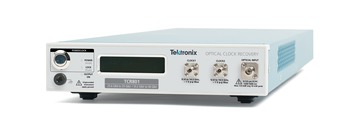
The TCR801 Optical Clock Recovery is a dual band clock recovery instrument centered around 26 and 53 GBd. The advanced architecture of the TCR801 allows the user to adjust Phase Lock Loop (PLL) bandwidth to comply with standards, and is a crucial component in the test and validation of the optical designs when used with other testing and measuring instruments.
Key features
- Designed to lock in two ranges:
- 25.6 to 29 GBd PAM2/NRZ or PAM4
- 51.2 to 58 GBd PAM2/NRZ or PAM4
- 1250 nm to 1650 nm wavelength
- Adjustable PLL bandwidths to configure the “Golden PLL” response required for the standard compliance testing
- Various locking modes that include intelligent auto relock, quick relock, and lock initiation from the front panel of the instrument
- Provides two separate RF clock outputs
- Ability to synthesize an adjustable clock output when an optical input signal is not available
- 2 x 20 LCD is used to view network IP address and current lock status, including the measured symbol rate
Applications
- Design/Verification of High-Speed Components and Systems
- Signal integrity analysis
- Compliance test for industry standards: 25G, 50G, 100G, 200G, 400G IEEE 802.3 standards such as 400GBASE-FR8, 400GBASE-DR4, and similar optical direct detect standards.
User interface
The TCR801 Optical Clock Recovery is operated with a simplified stand-alone user interface, with control from the Windows 10 or Windows Server UI. The communication between the Windows machine and the TCR801 Optical Clock Recovery is based on an IEEE 802.3 Ethernet network, such as 100BASE-T or 1000BASE-T standards. The corresponding Programmatic Interface (PI) commands are used in automation environments to control the instrument functionality.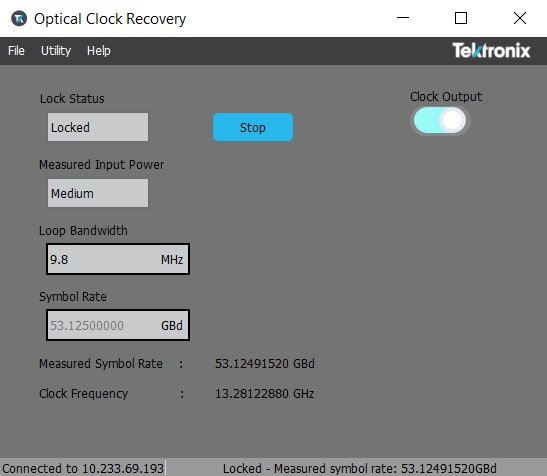
Locking modes
Depending on current workflow, the TCR801 includes several locking modes to help streamline device operation. Alongside lock initiation from UI or PI, the TCR801 front panel button can be used to initiate a lock and intelligently locks faster on signals similar to previous inputs. In manufacturing environments where optical switches are commonly used, the auto relock functionality typically locks to the target signal in less than 1 second, providing a stable trigger to sampling oscilloscopes in time critical situations.
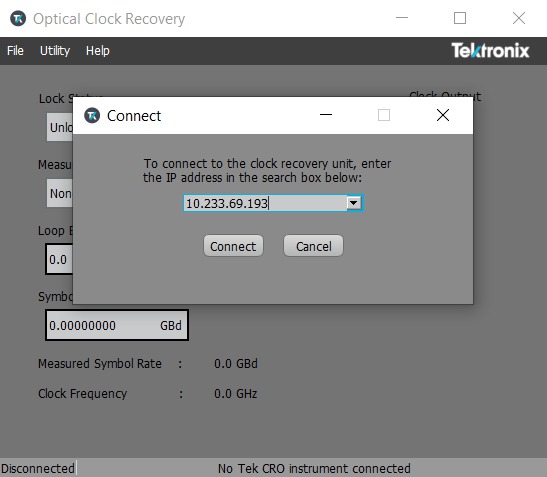

The TCR801 power button is multi-function. Press the power button to initiate a quick relock on the previously set symbol rate and hold to power off the instrument.
Compliance testing
The TCR801 Optical Clock Recovery compliance test for industry standards: 25G, 50G, 100G, 200G, 400G IEEE 802.3 standards such as 400GBASE-FR8, 400GBASE-DR4, and similar optical direct detect PAM4 standards. It also supports high speed NRZ standards such as 100 Gb Ethernet (100GBASE-LR4 or similar), which operates at the rate of 25.78125 Gb/s.
Compliant clock recovery
Golden PLL
Standards that use the Golden PLL for the compliance test relay on the TCR801 to recover the clock as per the IEEE 802.3 or similarly required loop bandwidth and roll-off.
The communication standards specify the testing carried out using a recovered clock derived from the data signal. Typically, Phase Lock Loop requirements are defined in terms of –3 dB bandwidth of the recovery loop, the rate of roll-off of the frequency response, and the degree of response peaking allowable.
The TCR801 Optical Clock Recovery instrument has an advanced architecture supporting two ranges of input symbol rates, around 26 GBd and around 53 GBd, with loop bandwidths in the required range for both PAM2/NRZ and PAM4 signals.
The recovered clock is around 13 GHz.
Interoperable and flexible
The TCR801 Optical Clock Recovery is used with any sampling oscilloscope, BERT, or Pattern Checker/Error Detector. For example, the TCR801 can interface with Equivalent Time (Sampling) Oscilloscopes, such as the Tektronix DSA8300 or TSO820 instruments for optical testing at 26 GBd or 53 GBd.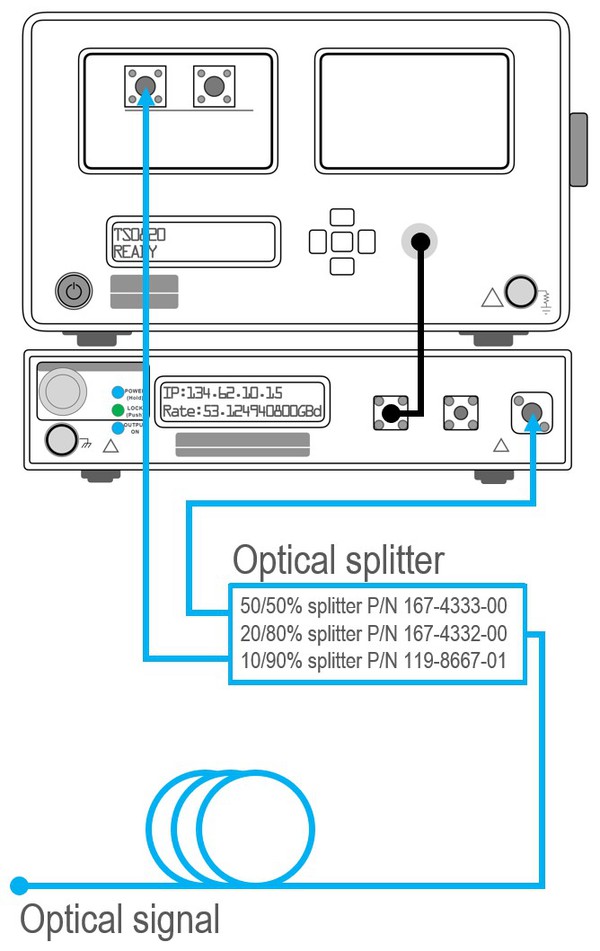
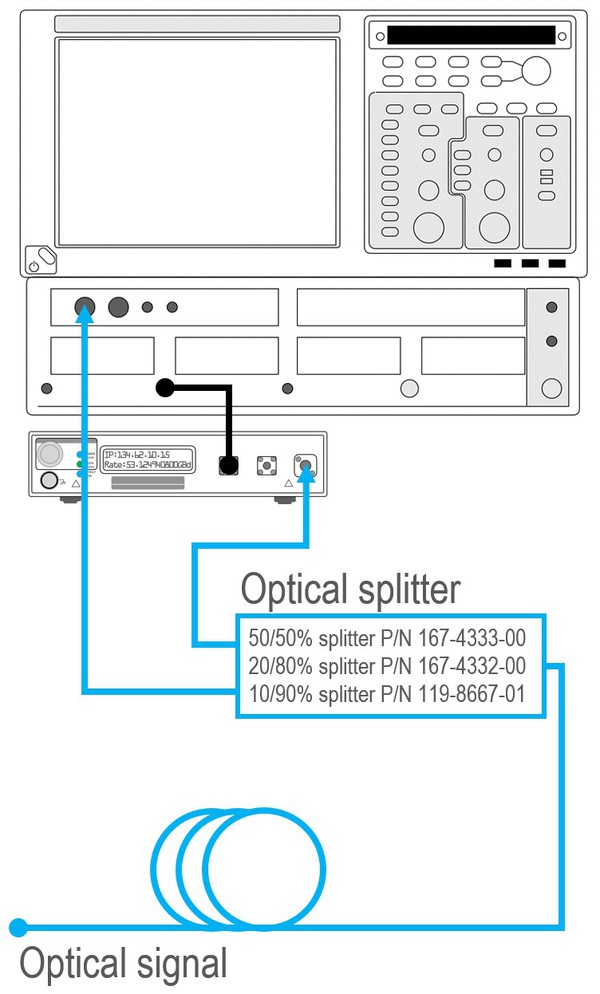
High-sensitivity operation accommodates low-amplitude signals
The TCR801 Optical Clock Recovery has high input sensitivity for applications involving low signals, which enables the user to use a wide variety of external optical splitters to trade off the power and is delivered to the TCR801 versus the acquisition platform (oscilloscope or error detector).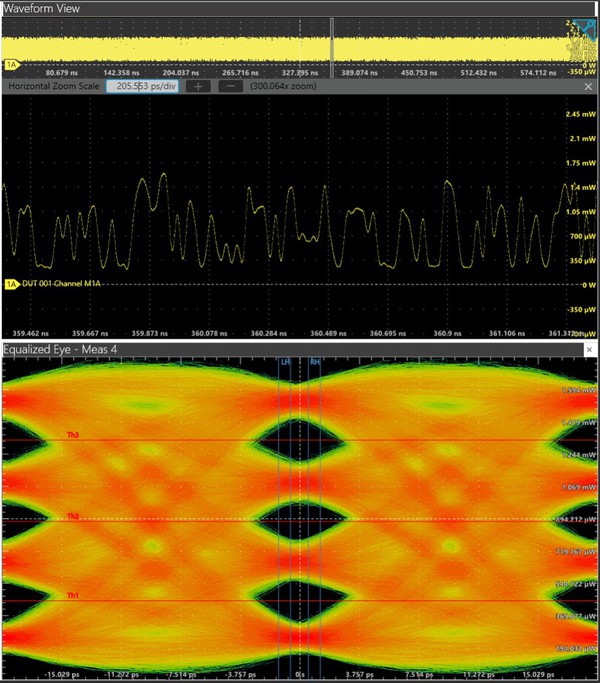
PC requirements
Windows 10 (64-bit) or Windows Server (64-bit)
Specifications
All specifications are guaranteed unless noted otherwise.
Instrument characteristics
- Data interfaces
- Single mode, FC/PC connector
- Symbol rate coverage
- Instrument operates over two nominal ranges (typical operation well beyond these)
- 25.6 to 29 GBd
- 51.2 to 58 GBd
- Wavelength range
- 1250 nm to 1650 nm
- Data insertion loss
- External splitter recommended
- 50/50% (included)
- 20/80%
- 10/90%
- Data average optical power (max)
- 4 dBm at 1310 nm
- Input sensitivity
-10 dBm at 1310 nm (typical, OMA) with PRBS13Q or similar
- 8 dBm at 1310 nm (typical, OMA) with PRBS31Q, SSPRQ or similar
Conditions
- PAM4 modulated signal with TDECQ < 3.4 dB. Sensitivity at higher TDECQ might be lower depending on signal distortion.
- OR PAM2/NRZ modulated signal passing 100GBASE-LR4 specification using pattern such as PRBS31 or other patterns with same or higher edge density.
- Counter accuracy
- +/- 10 ppm (typical)
Clock outputs
- Clock interface
- 50 Ω single-ended, AC coupled. 3.5 mm SMA compatible connector
- Clock output range
- For input data in range 25.6 to 29 GBd
- fBd / 2
- For input data in range 51.2 to 58 GBd
- fBd / 4
- Loop bandwidth
- User settable 0.2 MHz to 10 MHz
- Locking range, typical
- ±1000 ppm
- Peaking
- Response of the instrument is as required by IEEE 802.3bs with appropriate 20 dB/decade roll-off
- Jitter, RMS (typical)Jitter measured over all transitions; typical defined by 80th percentile.
- PRBS13Q
- < 195 fs with 200 uW OMA at 53.125 GBd, 4 MHz Loop Bandwidth
- SSPRQ
- < 415 fs with 600 uW OMA at 53.125 GBd, 4 MHz Loop Bandwidth
- Output waveform shape
- Sinusoidal
- Output amplitude
- 1 Vpp (typical)
Control
- Control interface
- IEEE 100BASE-T, 1000BASE-T, RJ45 connector
- Device information
- Serial number, revision codes are available for using software / PI
Physical
- Height
- 56 mm (2.20 in.)
- Depth
- 561 mm (22.09 in.)
- Width
- 203 mm (7.99 in.)
- Weight
- 4.5 kg (10 lbs.)
Environmental
- Temperature
- Operating
- 0 to 40°C
- Nonoperating
- –20 to 60°C
- Relative humidity
- Operating
- 95% at or below 30°C; 5-45% above 30°C to below 40°C
- Nonoperating
- 95% at or below 30°C; 5-45% above 30°C to below 60°C
- Acceleration (5-500 Hz)
- Operating
- 0.27 grms
- Nonoperating
- 2.28 grms
Ordering information
Clock recovery instruments
- TCR801
- 26 and 53 GBaud Optical Clock Recovery Unit
Standard accessories
- Power Supply
- External isolated Class 2 power supply. Tektronix P/N 119-8726-00
- Cable, Ethernet
- 2 m Ethernet cable (CAT6/RJ45). Tektronix P/N 174-7292-00
- 50/50 splitter
- 50%/50% Single Mode FC/PC Splitter. Tektronix P/N 167-4333-00
- 50 Ω termination
- Two 50 Ω termination. Tektronix P/N 015-1022-01
Service options
- Opt. G3
- Three Year Gold Care Plan. Includes expedited repair of all product failures including ESD and EOS, access to a loaner product during repair or advanced exchange to reduce downtime, priority access to Customer Support among others
- Opt. G5
- Five Year Gold Care Plan. Includes expedited repair of all product failures including ESD and EOS, access to a loaner product during repair or advanced exchange to reduce downtime, priority access to Customer Support among others
- Opt. R3
- Standard Warranty Extended to 3 Years. Covers parts, labor and 2-day shipping within country. Guarantees faster repair time than without coverage. All repairs include calibration and updates. Hassle free - a single call starts the process
- Opt. R5
- Standard Warranty Extended to 5 Years. Covers parts, labor and 2-day shipping within country. Guarantees faster repair time than without coverage. All repairs include calibration and updates. Hassle free - a single call starts the process
- Opt. C3
- Calibration service 3 years. Includes traceable calibration or functional verification where applicable, for recommended calibrations. Coverage includes the initial calibration plus 2 years calibration coverage
- Opt. C5
- Calibration service 5 years. Includes traceable calibration or functional verification where applicable, for recommended calibrations. Coverage includes the initial calibration plus 4 years calibration coverage.
- Opt. D1
- Calibration Data Report
- Opt. D3
- Calibration Data Report 3 Years (with Option C3)
- Opt. D5
- Calibration Data Report 5 Years (with Option C5)
Optional accessories
- TCR801 SPLT20
- 20%/80% Single Mode FC/PC Splitter. Tektronix P/N 167-4332-00
- TCR801 SPLT10
- 10%/90% Single Mode FC/PC Splitter. Tektronix P/N 119-8667-01



